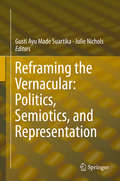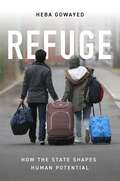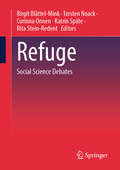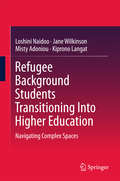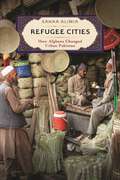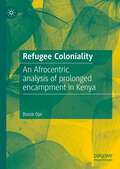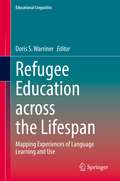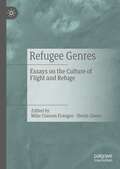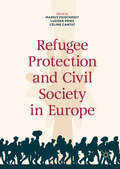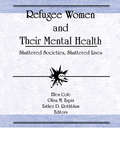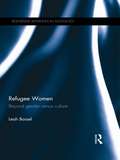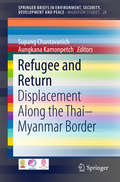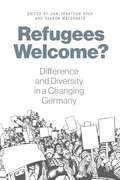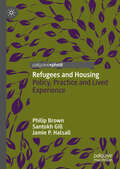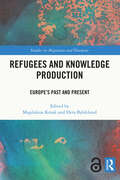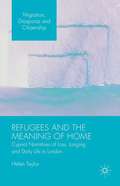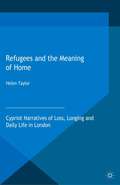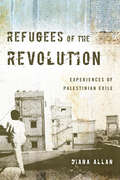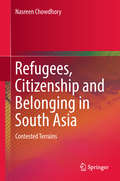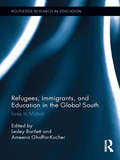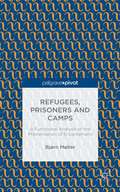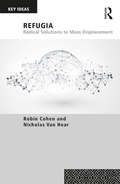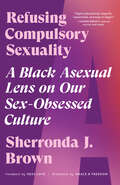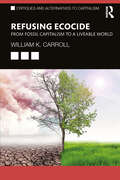- Table View
- List View
Reframing the Vernacular: Politics, Semiotics, and Representation
by Gusti Ayu Made Suartika Julie NicholsThe aim of this book is to reflect on ''vernacularity'' and culture. It concentrates on two major domains: first it attempts to reframe our understanding of vernacularity by addressing the subject in the context of globalisation, cross-disciplinarity, and development, and second, it discusses the phenomenon of how vernacularity has been treated, used, employed, manipulated, practiced, maintained, learned, reconstructed, preserved and conserved, at the level of individual and community experience. Scholars from a wide variety of knowledge fields have participated in enriching and engaging discussions, as to how both domains can be addressed. To expedite these aims, this book adopts the theme "Reframing the Vernacular: Politics, Semiotics, and Representation",organised around the following major sub-themes: • Transformation in the vernacular built environment • Vernacular architecture and representation • The meaning of home • Symbolic intervention and interpretation of vernacularity • The semiotics of place • The politics of ethnicity and settlement • Global tourism and its impacts on vernacular settlement • Vernacular built form and aesthetics • Technology and construction in vernacular built forms • Vernacular language - writing and oral traditions
Refuge: How the State Shapes Human Potential
by Heba GowayedHow states deny the full potential of refugees as people and perpetuate social inequalityAs the world confronts the largest refugee crisis since World War II, wealthy countries are being called upon to open their doors to the displaced, with the assumption that this will restore their prospects for a bright future. Refuge follows Syrians who fled a brutal war in their homeland as they attempt to rebuild in countries of resettlement and asylum. Their experiences reveal that these destination countries are not saviors; they can deny newcomers’ potential by failing to recognize their abilities and invest in the tools they need to prosper.Heba Gowayed spent three years documenting the strikingly divergent journeys of Syrian families from similar economic and social backgrounds during their crucial first years of resettlement in the United States and Canada and asylum in Germany. All three countries offer a legal solution to displacement, while simultaneously minoritizing newcomers through policies that fail to recognize their histories, aspirations, and personhood. The United States stands out for its emphasis on “self-sufficiency” that integrates refugees into American poverty, which, by design, is populated by people of color and marked by stagnation. Gowayed argues that refugee human capital is less an attribute of newcomers than a product of the same racist welfare systems that have long shaped the contours of national belonging.Centering the human experience of displacement, Refuge shines needed light on how countries structure the potential of people, new arrivals or otherwise, within their borders.
Refuge: Social Science Debates
by Birgit Blättel-Mink Katrin Späte Torsten Noack Corinna Onnen Rita Stein-RedentThe welcome culture of 2015 in Germany has, not least due to the (re)definition of safe countries of origin, turned into a deportation policy. How can this change in policy be understood and is it also accompanied by a change of attitude among the population? Which reasons for and which reasons against the admission of refugees are cited in social debates? This volume brings together analyses of the social discourse on dealing with refugees, questions of labour market integration and the practice of counselling refugees. Alongside academic analyses are reflective contributions from the practice of migration policy.With contributions by Olaf Struck.- David Stiller.- Helge Döring and Sebastian Kurtenbach.- Ann-Christine Lill, Janis Schneider and Sam Schneider.- Kirsten Hoesch. - Kathrin Weis.- Theresa Köhler and Kerstin Ettl.- Doris Beer.- André Pohlmann.- Katharina Resch, Gertraud Kremsner, Michelle Proyer, Camilla Pellech, Regina Studener-Kuras and Gottfried Biewe.The editors: Prof. Dr. Birgit Blättel-Mink is Professor of Sociology with a focus on industrial and organizational sociology at the Goethe University in Frankfurt/Main. Torsten Noack, M.A. Sociology, Head of the School for Work Education of the International Federation Stuttgart. Prof. Dr. Corinna Onnen is university professor for general sociology at the University of Vechta. Dr. Katrin Späte works at the Institute for Sociology at the University of Münster. Apl. Prof. Dr. Rita Stein-Redent works at the University of Vechta.
Refugee Background Students Transitioning Into Higher Education: Navigating Complex Spaces
by Jane Wilkinson Loshini Naidoo Misty Adoniou Kiprono LangatThis book is one of the first of its kind to examine the aspirations of refugee background students and accompanies them as they journey through the on-shore stage of settlement, enrolment and participation in the Australian education system. It begins with students’ experiences of on-shore settlement, followed by the move into schooling and finally, the subsequent transition into Australian higher education.Transitioning into higher education is a challenge for many students, particularly for those from under-represented equity groups. For refugee background students, navigating in, through and out of higher education can be particularly complex and challenging. Drawing on rich case studies from longitudinal research into refugee youth and the academic and professional staff in schools and universities who support them, the book provides powerful and compelling narratives and insights into this journey. It untangles the complex nature of transition for students of refugee background in higher education, locating it within broader social trends of increasing social and cultural diversity, as well as government practices and policies concerning the educational resettlement of refugees.
Refugee Children: Towards the Next Horizon
by Charles WattersThe last twenty years have seen unprecedented numbers of refugee children entering Western countries. Many of these children will have experienced the atrocities of war and issues concerning their care and treatment are high on the agenda of research bodies, policy makers and service providers. Refugee Children is the first book to offer a wide ranging analysis of the context of care and the measures taken by nation states and intergovernmental bodies to address perceived problems. Drawing on a detailed examination of practices, the book outlines a model of good practice in the care of refugee children. Topics covered include: the treatment of asylum seeking children at the borders of industrialised countries reception, psycho-social problems, social capital, education, and issues relating to cultural diversity and integration a critical analysis of responses to these problems including the development of special programmes for refugee children, elements of good practice in the field the transfer of good practice between countries implications for the development of services and academic research in this vital area. With a series of case studies examining practices from a number of countries, Refugee Children makes a vital contribution both to the social care literature in this field and to theory and research in refugee and migration studies. As such it is essential reading for academic researchers in a range of disciplines including social policy, education, migration and refugee studies as well as service providers in health care, social care, housing and education. Charles Watters is Director of the European Centre for the Study of Migration and Social Care in the School of Social Policy, Sociology and Social Research at the University of Kent.
Refugee Cities: How Afghans Changed Urban Pakistan
by Dr. Sanaa AlimiaSituated between the 1970s Soviet Union’s invasion of Afghanistan and the post–2001 War on Terror, Refugee Cities tells the story of how global wars affect everyday life for Afghans who have been living as refugees in Pakistan. This book provides a necessary glimpse of what ordinary life looks like for a long-term refugee population, beyond the headlines of war, terror, or helpless suffering. It also increases our understanding of how cities—rather than the nation—are important sites of identity-making for people of migrant origins.In Refugee Cities, Sanaa Alimia reconstructs local microhistories to chronicle the lives of ordinary people living in low-income neighborhoods in Peshawar and Karachi and the ways in which they have transformed the cities of which they are a part. In Pakistan, formal citizenship is almost impossible for Afghans to access; despite this, Afghans have made new neighborhoods, expanded city boundaries, built cities through their labor in construction projects, and created new urban identities—and often they have done so alongside Pakistanis. Their struggles are a crucial, neglected dimension of Pakistan’s urban history. Yet given that the Afghan experience in Pakistan is profoundly shaped by geopolitics, the book also documents how, in the War-on-Terror era, many Afghans have been forced to leave Pakistan. This book, then, is also a documentation of the multiple displacements migrants are subject to and the increased normalization of deportation as a part of “refugee management.”
Refugee Coloniality: An Afrocentric analysis of prolonged encampment in Kenya
by Bosco OpiThis book presents a decolonial and Afrocentric critique of prolonged encampment of refugees, centred on the case study of refugee camps in Kenya, introduced through the author’s decades-long experience of forced displacement. His positionality as a former refugee contributes to a wider discussion on representation, voice, and power within the refugee studies literature. Likewise, the revisiting of the refugee camp as site and tool of power from a colonial perspective, is an important and timely contribution to the literature. This book examines the camp as a colonial innovation and the enduring colonial logics of supposedly ‘humanitarian’ extended encampment. Drawing on the anti-colonial theorists such as Fanon, Mbembe, and Nyerere, etc, it argues for an Africa without borders or encampment. The study is interdisciplinary, encompassing forced migration/refugee studies, camp studies, decolonial studies, and African studies. More broadly, it seeks to contribute to the literature on the politics of asylum in Africa through a critical examination of the colonial origins and the practice of encampment in Kenya.
Refugee Education across the Lifespan: Mapping Experiences of Language Learning and Use (Educational Linguistics #50)
by Doris S. WarrinerThis edited volume demonstrates how an educational linguistics approach to inquiry is well positioned to identify, examine, and theorize the language and literacy dimensions of refugee-background learners’ experiences. Contributions (from junior and senior scholars) explore and interrogate the policies, practices and ideologies of language and literacy in formal and informal educational settings as well as their implications for teaching and learning. Chapters in this collection will inform advances in the research base, future innovations in pedagogy, the professional development of teachers, and the educational opportunities that are made available to refugee-background children, youth and adults. The work showcased here will be of particular interest to teachers and teacher educators committed to inclusion, equity, and diversity; those developing curriculum and/or assessment; and researchers interested in the relationship between language practice, language policy and refugee education.
Refugee Genres: Essays on the Culture of Flight and Refuge
by Mike Classon Frangos Sheila GhoseThis volume brings together research on the forms, genres, media and histories of refugee migration. Chapters come from a range of disciplines and interdisciplinary approaches, including literature, film studies, performance studies and postcolonial studies. The goal is to bring together chapters that use the perspectives of the arts and humanities to study representations of refugee migration. The chapters of the anthology are organized around specific forms and genres: life-writing and memoir, the graphic novel, theater and music, film and documentary, coming-of-age stories, street literature, and the literary novel.
Refugee Protection and Civil Society in Europe
by Ludger Pries Margit Feischmidt Celine CantatThis volume analyses civil society as an important factor in the European refugee regime. Based on empirical research, the chapters explore different aspects, structures and forms of civil society engagement during and after 2015. Various institutional, collective and individual activities are examined in order to better understand the related processes of refugees’ movements, reception and integration. Several chapters also explore the historical development of the relationship between a range of actors involved in solidarity movements and care relationships with refugees across different member states. Through the combined analysis of macro-level state and European policies, meso-level organization's activities and micro-level individual behaviour, Refugee Protection and Civil Society in Europe presents a comprehensive exploration of the refugee regime in motion, and will be of interest to scholars and students researching migration, social movements, European institutions and social work.
Refugee Women and Their Mental Health: Shattered Societies, Shattered Lives
by Ellen Cole Esther D Rothblum Oliva M EspinCurrently, there are over 15 million legally designated refugees all over the world and it is documented that 75 percent of those refugees are women, yet most of the existent literature does not focus on this group as women. Most of the literature focuses on political, economic, and social issues with very little reference to the mental health implications of the refugees’experiences as women. Refugee Women and Their Mental Health begins to fill this paucity of information on female refugees’experiences. A book of immediate interest, Refugee Women and Their Mental Health focuses on understanding the plight of women refugees around the world, with an emphasis on mental health. The book adds successful and innovative treatment and recovery models for these women survivors.Some of the chapters are written by women who are therapists/psychologists now and who have been refugees themselves. This adds additional insight into the plight and resulting mental health problems of refugee women. The chapters cover a vast range of topics: torture and sexual abuse as refugees/victims of state violence elderly women refugees immigration law and women refugees first-person narratives the transformation of identity successful creative treatment programsIt becomes clear that women refugees from all over the world under different political events and circumstances share common values and have similar mental health needs. Refugee Women and Their Mental Health explores processes of recovery from the traumas experienced by these women and offers a variety of models for the application of feminist theory to the plight of women refugees. Experienced therapists of women and those in training to be therapists will want to read this book. The topics of refugee women rarely comes up in training programs, so the information in this book is vital for therapists, policy makers, and other service providers and professors of psychology of women, immigration and social work issues, and women and mental health issues.
Refugee Women: Beyond Gender versus Culture (Routledge Advances in Sociology)
by Leah BasselDebates over the headscarf and niqab, so-called ‘sharia-tribunals’, Female Genital Operations and forced marriages have raged in Europe and North America in recent years, raising the question – does accommodating Islam violate women’s rights? The book takes issue with the terms of this debate. It contrasts debates in France over the headscarf and in Canada over religious arbitration with the lived experience of a specific group of Muslim women: Somali refugee women. The challenges these women eloquently describe first-hand demonstrate that the fray over accommodating culture and religion neglects other needs and engenders a democratic deficit. In Refugee Women: Beyond Gender versus Culture, new theoretical perspectives recast both the story told and who tells the tale. By focusing on the politics underlying how these debates are framed and the experiences of women at the heart of these controversies, women are considered first and foremost as democratic agents rather than actors in the ‘culture versus gender’ script. Crucially, the institutions and processes created to address women’s needs are critically assessed from this perspective. Breaking from scholarship that focuses on whether the accommodation of culture and religion harms women, Bassel argues that this debate ignores the realities of the women at its heart. In these debates, Muslim women are constructed as silent victims. Bassel pleads compellingly for a consideration of women in all their complexity, as active participants in democratic life. The book will appeal to students and scholars throughout the social sciences, particularly of sociology, political science and women’s studies.
Refugee and Return: Displacement along the Thai-Myanmar Border (SpringerBriefs in Environment, Security, Development and Peace #28)
by Supang Chantavanich and Aungkana KamonpetchThis book provides essential background information on the protracted displacement of several ethnic groups along the Thai-Myanmar border before turning to an examination of whether Myanmar has now shifted into a post-conflict society, the expected challenges involved in reintegrating returnees to Myanmar, and the possibility of voluntary and sustainable repatriation. The authors conclude that, given the current, ongoing security challenges and the lack of job opportunities in Myanmar, voluntary repatriation is not yet feasible as a long-term solution. After more than 60 years of conflict and displacement, Myanmar is now in the midst of political reform. A new nominally civilian government and the promise of elections in 2015 have raised hopes of a lasting democratic transition after years of military rule. For the first time in decades, repatriation of refugees in Thailand is being discussed as a real and imminent possibility.
Refugees Welcome?: Difference and Diversity in a Changing Germany
by Sharon Macdonald Jan-Jonathan BockThe arrival in 2015 and 2016 of over one million asylum seekers and refugees in Germany had major social consequences and gave rise to extensive debates about the nature of cultural diversity and collective life. This volume examines the responses and implications of what was widely seen as the most significant and contested social change since German reunification in 1990. It combines in-depth studies based on anthropological fieldwork with analyses of the longer trajectories of migration and social change. Its original conclusions have significance not only for Germany but also for the understanding of diversity and difference more widely.
Refugees and Housing: Policy, Practice and Lived Experience
by Philip Brown Jamie P. Halsall Santokh GillHousing has always had a close association with the lives refugees lead in exile and the settlement of refugees is, at its core, a housing issue. Refugees move from their home, perhaps through various other places, to finally arrive in a nation-state which provides them with security of status and the promise of assistance to continue their lives. At the foundation of this promise of refuge is the provision of a safe and secure home. Despite this, the knowledge base about housing and its significance in the lives of refugees is not fully understood and this risks understating the enormous impact housing has on the settlement of refugees more broadly. This book makes an important contribution to the literature on the relationship between sanctuary and housing. It draws on new empirical research to examine how refugees have transitioned through the housing system over the last three decades and how changes in policy and the routes into refugee status has mediated these experiences.
Refugees and Knowledge Production: Europe's Past and Present (Studies in Migration and Diaspora)
by Heta Björklund Magdalena KmakBuilding on research within the fields of exile studies and critical migration studies and drawing links between historical and contemporary ‘refugee scholarship’, this volume challenges the bias of methodological nationalism and Eurocentrism in discussing the multifaceted forms of knowledge emerging in the context of migration and mobility. With critical attention to the meaning, production and scope of ‘refugee scholarship’ generated at the institutions of higher education, it also focuses on ‘refugee knowledge’ produced outside academia, and scrutinizes the conditions according to which it is validated or silenced. Presenting studies of historical refuge and exile, together with the experiences of contemporary refugee scholars, this book will appeal to scholars across the social sciences with interests in forced migration, refugee studies, the sociology of knowledge and the phenomenon of ‘insider’ knowledge, and research methods and methodology.
Refugees and the Meaning of Home: Cypriot Narratives of Loss, Longing and Daily Life in London (Migration, Diasporas and Citizenship)
by Helen TaylorRefugees and the Meaning of Home.
Refugees and the Meaning of Home: Cypriot Narratives of Loss, Longing and Daily Life in London (Migration, Diasporas and Citizenship)
by Helen TaylorThis book explores the meaning of home for Cypriot refugees living in London since their island was torn apart by war. Taking an innovative approach, it looks at how spaces, time, social networks and sensory experiences come together as home is constructed. It places refugee narratives at its centre to reveal the agency of those forced to migrate.
Refugees of the Revolution: Experiences of Palestinian Exile
by Diana AllanSome sixty-five years after 750,000 Palestinians fled or were expelled from their homeland, the popular conception of Palestinian refugees still emphasizes their fierce commitment to exercising their "right of return. " Exile has come to seem a kind of historical amber, preserving refugees in a way of life that ended abruptly with "the catastrophe" of 1948 and their camps#151;inhabited now for four generations#151;as mere zones of waiting. While reducing refugees to symbols of steadfast single-mindedness has been politically expedient to both sides of the Arab-Israeli conflict it comes at a tremendous cost for refugees themselves, overlooking their individual memories and aspirations and obscuring their collective culture in exile. Refugees of the Revolution is an evocative and provocative examination of everyday life in Shatila, a refugee camp in Beirut. Challenging common assumptions about Palestinian identity and nationalist politics, Diana Allan provides an immersive account of camp experience, of communal and economic life as well as inner lives, tracking how residents relate across generations, cope with poverty and marginalization, and plan#150;#150;pragmatically and speculatively#151;for the future. She gives unprecedented attention to credit associations, debt relations, electricity bartering, emigration networks, and NGO provisions, arguing that a distinct Palestinian identity is being forged in the crucible of local pressures. What would it mean for the generations born in exile to return to a place they never left? Allan addresses this question by rethinking the relationship between home and homeland. In so doing, she reveals how refugees are themselves pushing back against identities rooted in a purely nationalist discourse. This groundbreaking book offers a richly nuanced account of Palestinian exile, and presents new possibilities for the future of the community.
Refugees, Citizenship and Belonging in South Asia: Contested Terrains
by Nasreen ChowdhoryThis book examines forced migration of two refugees groups in South Asia. The author discusses the claims of “belonging” of refugees, and asserts that in practice “belonging” can extend beyond the state-centric understanding of membership in South Asian states. She addresses two sets of interrelated questions: what factors determine whether refugees are relocated to their home countries in South Asia, and why do some repatriated groups re-integrate more successfully than others in “post-peace” South Asian states? This book answers these questions through a study of refugees from Sri Lanka and Bangladesh who sought asylum in India and were later relocated to their countries of origin. Since postcolonial societies have a typical kind of state-formation, in South Asia’s case this has profoundly shaped questions of belonging and membership. The debate tends to focus on citizenship, making it a benchmark to demarcate inclusion and exclusion in South Asian states. In addition to qualitative analysis, this book includes narratives of Sri Lankan and Chakma refugees in post-conflict and post-peace Sri Lanka and Bangladesh respectively, and critiques the impact of macro policies from the bottom up.
Refugees, Immigrants, and Education in the Global South: Lives in Motion (Routledge Research in Education #94)
by Lesley Bartlett Ameena Ghaffar-KucherThe unprecedented human mobility the world is now experiencing poses new and unparalleled challenges regarding the provision of social and educational services throughout the global South. This volume examines the role played by schooling in immigrant incorporation or exclusion, using case studies of Thailand, India, Nepal, Hong Kong/PRC, the Philippines, the United Arab Emirates, Jordan, Kenya, Egypt, South Africa, Senegal, Sudan, Mexico, and the Dominican Republic. Drawing on key concepts in anthropology, the authors offer timely sociocultural analyses of how governments manage increasing diversity and how immigrants strategize to maximize their educational investments. The findings have significant implications for global efforts to expand educational inclusion and equity.
Refugees, Prisoners and Camps: A Functional Analysis of the Phenomenon of Encampment
by Bjørn MøllerWhat do refugee and concentration camps, prisons, terrorist and guerrilla training camps and prisoner of war camps have in common? Arguably they have all followed an 'outsides inside' model, enforcing a dichotomy between perceived 'desirable' and 'undesirable' characteristics. This separation is the subject of Moller's multidisciplinary study. "
Refugia: Radical Solutions to Mass Displacement (Key Ideas)
by Robin Cohen Nicholas Van HearThis is an unusual book. Combining social science fiction, utopianism, pragmatism, sober analysis and innovative social theory, the authors address one of the biggest dilemmas of our age – how to solve the problems arising from mass displacement. As early versions of the solution proposed by Robin Cohen and Nicholas Van Hear filtered out, their vision of a new, networked, transnational archipelago, called Refugia, was met with scepticism by established refugee scholars. Others were more intrigued, more open-minded, or perhaps just holding their fire until this book was finally published. As it at least has the virtue of originality, why not judge the proposal for yourself? Read it and craft your own critique. The authors have initiated an openly pro-refugee vision that all can help to shape. Written in a clear and direct style, this book will appeal to scholars and students in social sciences courses (political and social theory, sociology, anthropology, politics, law, security studies), practitioners in the refugee/migration management, as well as to an informed public ready to engage with this pressing issue.
Refusing Compulsory Sexuality: A Black Asexual Lens on Our Sex-Obsessed Culture
by Sherronda J. BrownFor readers of Ace and Belly of the Beast: A Black queer feminist exploration of asexuality--and an incisive interrogation of the sex-obsessed culture that invisibilizes and ignores asexual and A-spec identity.Everything you know about sex and asexuality is (probably) wrong.The notion that everyone wants sex--and that we all have to have it--is false. It&’s intertwined with our ideas about capitalism, race, gender, and queerness. And it impacts the most marginalized among us. For asexual folks, it means that ace and A-spec identity is often defined by a queerness that&’s not queer enough, seen through a lens of perceived lack: lack of pleasure, connection, joy, maturity, and even humanity.In this exploration of what it means to be Black and asexual in America today, Sherronda J. Brown offers new perspectives on asexuality. She takes an incisive look at how anti-Blackness, white supremacy, patriarchy, heteronormativity, and capitalism enact harm against asexual people, contextualizing acephobia within a racial framework in the first book of its kind. Brown advocates for the &“A&” in LGBTQIA+, affirming that to be asexual is to be queer--despite the gatekeeping and denial that often says otherwise.With chapters on desire, f*ckability, utility, refusal, and possibilities, Refusing Compulsory Sexuality discusses topics of deep relevance to ace and a-spec communities. It centers the Black asexual experience--and demands visibility in a world that pathologizes and denies asexuality, denigrates queerness, and specifically sexualizes Black people.A necessary and unapologetic reclamation, Refusing Compulsory Sexuality is smart, timely, and an essential read for asexuals, aromantics, queer readers, and anyone looking to better understand sexual politics in America.
Refusing Ecocide: From Fossil Capitalism to a Liveable World (Critiques and Alternatives to Capitalism)
by William K. CarrollRefusing Ecocide: From Fossil Capitalism to a Liveable World provides a critical analysis of the central role of fossil capitalism in causing climate change and argues that only alternatives based upon democratic eco-socialism can prevent the deepening of the climate crisis.Employing three core concepts within historical materialism – capitalist accumulation, imperialism and hegemony – it locates the existential threat of our changing climate in the drive for increasing profit and growth, the domination of advanced capitalist states that strip resources and exploit cheap labour, and the consent to the capitalist way of life in the global North. With attention to the ways in which, powered by fossil fuels, capital has subjected the world to its predatory logic, this book charts this history and surveys the damage from the Industrial Revolution to today’s deep civilizational crisis, arguing that the market-based and purely technological solutions of ‘climate capitalism’ are too little, too late.A call for a multifaceted and multi-scalar shift away from capitalist accumulation, imperialism and class hegemony and instead towards democratic eco-socialism, it will appeal to scholars across the social sciences with interests in political and social theory, the environment and sustainability.
